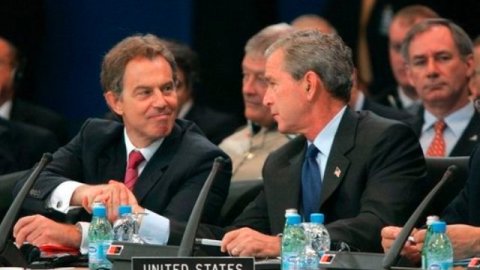Tony Blair’s Fantasy Land

AS the dust begins to settle on an extraordinary week dominated by the astonishing spectacle of a former Prime Minister peddling memoirs whose vulgarity and venality thoroughly demeans the office that he once held what of the object of much of Tony Blair’s anguished prose – his former Chancellor and eventual successor, Gordon Brown?
Brown has found himself thoroughly traduced, politically and personally. However “impossible” he may have been to work with, whatever his “emotional flaws” and serially frustrated ambitions, Tony Blair’s heap of ordure dumped on the man he once claimed to be almost married to, breaks new, low boundaries in British politics. Does Brown really deserve this? And why is so much credence given to what Blair himself would once have described as “tittle tattle”? Once upon a time retiring Statesmen wrote candidly and lucidly about great matters of State and international diplomacy. Sadly, Tony Blair, the great ‘actor manager’ has given us the political equivalent of ‘chick lit’.
Badly bruised by Labour’s election defeat, and chastened by his grinding final years in the job he had pined for, Gordon Brown is today maintaining a dignified silence. I doubt if he could have churned out anything as racy as Blair’s ‘A Journey’, even had he wanted to. Instead, the former Chancellor is completing the final chapters of a book on the World economy. He and his wife Sarah have announced that they will shortly be embarking on several charitable projects connected with the developing World. This, they say, will be pro-bono work. And while I also doubt that Brown would have the chutzpah – or the brass neck – to set up anything approaching Tony Blair’s curious hybrid organisation that miraculously combines charitable work with lobbying and expensive, glitzy PR, the contrast between Blair’s drive for money and Brown’s disinterest in it, is highly instructive.
Of Blair’s bolt from the blue, that it was he rather than Gordon, who came up with the idea of giving the Bank of England independence, a jibe that goes to the heart of what Brown believes is one of his most significant achievements, there is silence from Brown.
Perhaps it’s true, or maybe Brown no longer thinks it was such a good idea.
Of Blair’s fury that Brown would dare threaten a Labour NEC Inquiry into the notorious ‘cash for peerages’ scandal, that culminated in Blair being interviewed by the police and which set in train the doomed ‘Curry House’ plot to oust Blair and replace him with Brown, there is also silence from the former Chancellor.
But that leaves us to make our own judgements. Blair’s hob knobbing with the rich and powerful was nauseating enough, but it was his cavalier attitude to political fund raising, ‘who gave what and for what in return’, which was truly shocking. No wonder Blair was furious with Brown for threatening an internal enquiry; he knew just how combustible and politically life threatening that threat was. Handing over peerages in return for cash donations is an offence, and has been since Lloyd George tried to pack the House of Lords with his cronies.
And Blair should be very grateful for Brown’s long suffering silence over his ruinous foreign policy decisions that bled the Treasury dry, and committed Britain to a disastrous war in Iraq and a war seemingly without end in Afghanistan. That Brown never pressed the nuclear button and declared the obvious truth that Tony Blair hadn’t a real Labour bone in his body will mystify those who know that it could have bought Brown the leadership a whole lot earlier.
Others have attempted psychological studies of a relationship of which Blair says “Originally we were like lovers, desperate to get to love making, then a married couple who argued and hated rivals”, most notably the late Leo Abse in his seminal “The Man Behind the Smile; Tony Blair and the Politics of Perversion”. Abse’s book unsurprisingly found few brave enough to review it, nor did he stray much from Blair’s own narcissm, to his relationship with his Chancellor. But if Blair really believes his long term rival had “zero emotional intelligence”, it may be possible to finally get to the heart of what went so horribly wrong and to judge who emerges from it all in a better light. Having observed Blair and Brown from close quarters, and from a decade of being an outsider on the inside of the New Labour, my view is that Gordon Brown naively believed so many of the promises that Tony fluttered down on him. He believed him when he said that Brown was the true successor to John Smith. He believed him again when he pledged to stand down in Brown’s favour in2003. When the penny finally dropped that Blair was simply humouring him and the treacherous Mandelson had skipped sides, Brown surrounded himself with courtiers equally capable as those in the dank Tudor Court surrounding the Prime Minister.
History though may be kinder to Brown than to Blair. For all of Brown’s shortcomings, there is substance to him, in marked contrast to the lightweight Blair, whose memoirs have done little to persuade many that his was largely a wasted decade in office.





